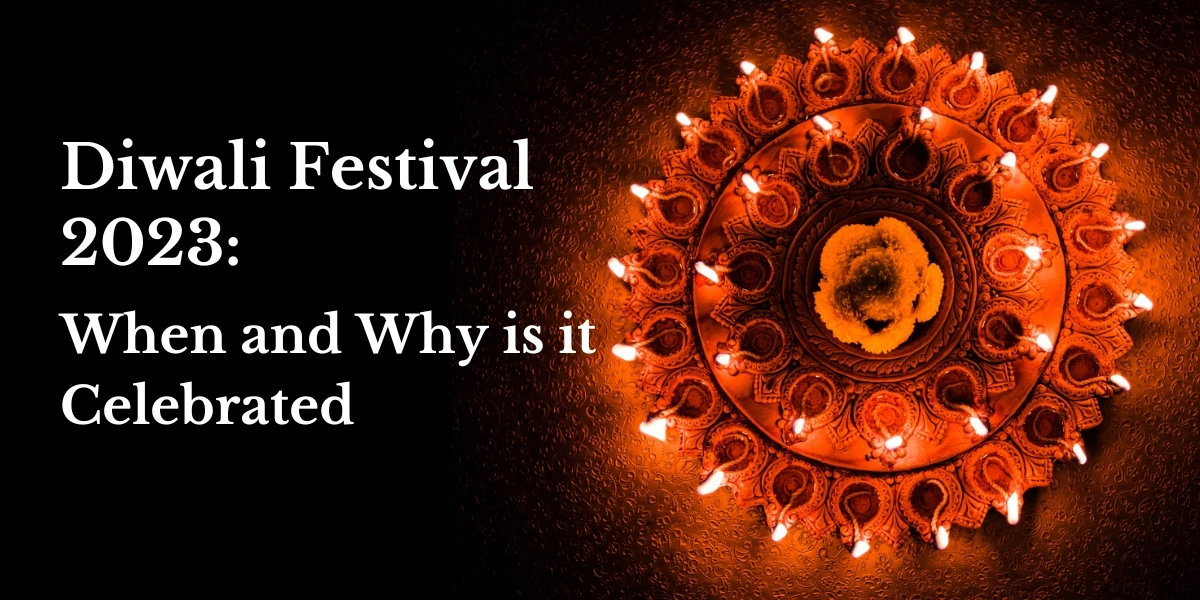Diwali Festival 2023: When and Why is it Celebrated
Diwali Festival 2023: Diwali, also known as Dipavali or Deepavali, is a festival of lights celebrated by Jains, Sikhs, Hindus, and Newar Buddhists. This five-day extravaganza sees individuals illuminating their residences, temples, and workplaces with diyas (oil lamps), candles, and lanterns. Diwali holds a special place as an annual occasion for families, communities, and associations to come together and strengthen their bonds. According to the Gregorian calendar, this joyous Diwali festival 2023 falls between mid-October and mid-November.
When is Diwali celebrated around the world?
Diwali is a significant Hindu festival that symbolizes the victory of good over evil, knowledge over ignorance, and light over darkness. In preparation for the Diwali festival, people engage in the tasks of renovating, cleaning, and adorning their homes and workplaces. Moreover, on the third day of these festivities, participants dress in their most splendid attire. These celebrations, coupled with traditional rituals, typically span a five-day period, during which office buildings, temples, residences, and shops are brilliantly illuminated. The pinnacle of this festival generally occurs on the third day, coinciding with the darkest night of the Kartika month.
In various locations, Diwali festival celebrations may encompass parades, fairs, musical performances, and captivating dance shows in local parks. Depending on the region, there may also be the practice of offering prayers to one or more Hindu deities, with Lakshmi, the goddess of wealth, prosperity, and good fortune, being a common choice. The Festival of Lights typically commences two days before its climax on the third day and concludes two days thereafter. These days include:
Dhantera: Initiates the commencement of Diwali festival celebrations, during which households and businesses undergo a thorough cleaning, diyas are set aglow, doorways are adorned with rangoli (vibrant patterns crafted from colored sand grains, flower petals, and rice flour), shopping sprees ensue, and finally, prayers and offerings are dedicated to deities.
Choti Diwali, Naraka Chaturdasi: Marks the festival’s second day. “Choti” translates to “little,” “Naraka” signifies “hell,” and “Chaturdasi” means “fourteenth.” The rituals observed on this day are believed to provide salvation to souls suffering in Naraka. Additionally, Hindus indulge in the purchase of festive foods, with a particular emphasis on sweets.
Diwali, Lakshmi Puja: This marks the third day and the climax of the Diwali festival. On this day, temples and homes are illuminated by diyas, and the young members of the family visit the senior community members. On this day, Hindus feast and share the abundance of the season at home, workplace, community, and so on. People will dress up in new outfits and women will don their finest jewelry in the evening. At sunset, families will gather to offer prayers to various deities including Lakshmi, Sita, Rama, Kubera, Saraswati, and Ganesha, among others.
Annakut, Padwa, Govardhan Puja: This is the fourth day of the festivities known as Annakut, Padwa, and Govardhan Puja, which honor the union of a wife and a husband. In some societies, husbands present their wives with gifts while in others, parents invite newly wedded sons or daughters along with their spouses to special meals. Other communities prepare various dishes with a variety of ingredients and dedicate the meals to Krishna before sharing them with the community.
Bhai Duj, Bhau-beej: On the fifth day, the sister-brother relationship is honored in accordance with the myths surrounding Raksha Bandhan, Yama, and Yamuna, as well as Krishna’s visit to Subhadra, his sister.
Goddess Laxmi and Diwali Festival connection
Most Hindus worship Goddess Lakshmi during Diwali because she is revered as a goddess of wealth and prosperity. This deity is said to have been born on the New Moon day of the Karthik month. Lakshmi’s serene beauty moved Lord Vishnu, and he decided to marry her. To commemorate this event, the diyas were lit in a row. Since then Diwali has been celebrated to worship Goddess Lakshmi and seek her blessings.

